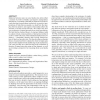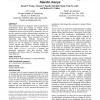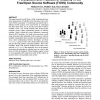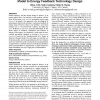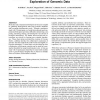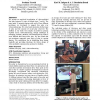109
Voted
CHI
2010
ACM
15 years 9 months ago
2010
ACM
Relations between users on social media sites often reflect a mixture of positive (friendly) and negative (antagonistic) interactions. In contrast to the bulk of research on soci...
127
Voted
CHI
2010
ACM
15 years 9 months ago
2010
ACM
We present results from a qualitative study examining how professionals living and working in Nairobi, Kenya regularly use ICT in their everyday lives. There are two contributions...
113
Voted
CHI
2010
ACM
15 years 9 months ago
2010
ACM
Eco-feedback technology provides feedback on individual or group behaviors with a goal of reducing environmental impact. The history of eco-feedback extends back more than 40 year...
89
Voted
CHI
2010
ACM
15 years 9 months ago
2010
ACM
This paper presents findings from a qualitative study of people’s everyday interactions with energy-consuming products and systems in the home. Initial results from a large onli...
102
click to vote
CHI
2010
ACM
15 years 9 months ago
2010
ACM
CT This paper presents results from a study examining perceptions and practices of usability in the free/open source software (FOSS) community. 27 individuals associated with 11 di...
119
Voted
CHI
2010
ACM
15 years 9 months ago
2010
ACM
Global warming, and the climate change it induces, is an urgent global issue. One remedy to this problem, and the focus of this paper, is to motivate sustainable energy usage beha...
102
Voted
CHI
2010
ACM
15 years 9 months ago
2010
ACM
Molecular and computational biologists develop new insights by gathering heterogeneous data from genomic databases and leveraging bioinformatics tools. Through a qualitative study...
118
Voted
CHI
2010
ACM
15 years 9 months ago
2010
ACM
Public transit systems play an important role in combating traffic congestion, reducing carbon emissions, and promoting compact, sustainable urban communities. The usability of p...
127
Voted
CHI
2010
ACM
15 years 9 months ago
2010
ACM
Previous research has shown a relationship between use of social networking sites and feelings of social capital. However, most studies have relied on self-reports by college stud...
102
Voted
CHI
2010
ACM
15 years 9 months ago
2010
ACM
We present an empirical investigation of video-mediated free play between 13 pairs of friends (ages 7 and 8). The pairs spent 10 minutes playing with each of four different protot...
